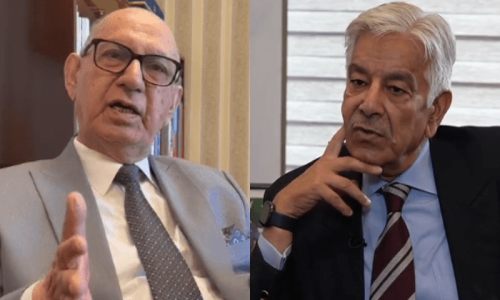LONDON, Sept 26: Israel gave serious thought this spring to launching a military strike on Iran’s nuclear sites, but was told by US President George Bush he would not support it and did not expect to revise that view for the rest of his presidency, senior European diplomatic sources have told the Guardian.
Prime minister Ehud Olmert used the occasion of Mr Bush’s trip to Israel for the 60th anniversary of the state’s founding to raise the issue in a one-on-one meeting on May 14, the sources said. “He took it [the refusal of a US green light] as where they were at the moment, and that the US position was unlikely to change as long as Bush was in office,” they added.
The sources work for a European head of government who met the Israeli leader some time after the Bush visit. Their talks were so sensitive that no note-takers attended, but the European leader subsequently divulged to his officials the highly sensitive contents of what Mr Olmert had told him of Mr Bush’s position.
Bush’s decision to refuse to support a strike on Iran appeared to be based on two factors, the sources say. One was US concern over Iran’s likely retaliation, which would probably include a wave of attacks on US military and other personnel in Iraq and Afghanistan, as well as on shipping in the Persian Gulf.
The other was US anxiety that Israel would not succeed in disabling Iran’s nuclear facilities in a single assault even with the use of dozens of aircraft. It could not mount a series of attacks over several days without this risking becoming full-scale war. So the benefits would not outweigh the costs.
Iran has repeatedly insisted it would react with force to any attack. Some western government analysts believe this could include asking Lebanon’s Hezbollah to strike at the United States.
Even if Israel were to launch an attack on Iran without US approval, its planes could not reach their targets without the US becoming aware of their flight path and having time to ask for them to abandon their mission.
“The shortest route to Natanz lies across Iraq and the US has total control of Iraqi airspace,” the official said. Natanz, 150kms north of Isfahan, is the site of a plant using enrichment uranium.
In this context Iran would be bound to assume Bush had approved it, even if the White House denied foreknowledge, raising the prospect of an attack against the US.Olmert himself raised the possibility of an attack at a press conference during a visit to London last November, when he said sanctions were not enough to block Iran’s nuclear programme.
“Economic sanctions are effective. They have an important impact already, but they are not sufficient. So there should be more. Up to where? Up until Iran will stop its nuclear programme,” he said.
The revelation that Olmert was not merely sabre-rattling to try to frighten Iran but considered the option seriously enough to discuss it with Bush shows how concerned Israeli officials had become.
Bush’s refusal to support an attack, and the strong hint he would not change his mind, is likely to end speculation that Washington might be preparing an “October surprise” before the presidential election.
Some analysts have argued that Bush would back an Israeli attack in an effort to help John McCain by creating an eve-of-poll security crisis. Others have said that in the case of an Obama victory, Vice-President Dick Cheney, the main White House hawk, would want to cripple Iran’s nuclear programme in the dying weeks of Bush’s term.
Last night Mark Regev, Olmert’s spokesman, reacted to the Guardian’s story saying: “The need to prevent Iran from obtaining nuclear weapons is raised at every meeting between the prime minister and foreign leaders. Israel prefers a diplomatic solution to this issue but all options must remain on the table. Your unnamed European source attributed words to the prime minister that were not spoken in any working meeting with foreign guests.”
Gordon Johndroe, spokesman for the US National Security Council, said.
“I’m going to decline to comment on any private conversations the president had. The president’s position is that all options are on the table but diplomacy remains our first course of action.”
Three weeks after Bush’s red light, Israel mounted a massive air exercise covering several hundred kilometres in the eastern Mediterranean on June 2. The size and scope of the exercise ensured that the US and other states in the region saw it, said a US official, who estimated the distance was about the same as from Israel to Natanz.
A few days later Israel’s deputy prime minister, Shaul Mofaz, told the newspaper Yediot Ahronot: “If Iran continues its programme to develop nuclear weapons, we will attack it. The window of opportunity has closed. The sanctions are not effective. There will be no alternative but to attack Iran in order to stop the nuclear programme.”
The US announced two weeks ago that it would sell Israel 1,000 bunker-busting bombs. The move was interpreted by some analysts as a consolation prize for Israel after Bush told Olmert of his opposition to an attack on Iran. But it could also enhance Israel’s attack options in case the next US president revives the military option.
—Dawn/The Guardian News Service















































Dear visitor, the comments section is undergoing an overhaul and will return soon.